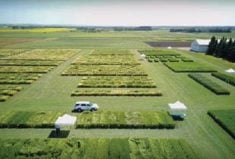At first, Kim Good didn’t really see the point of a program geared toward women agri-food entrepreneurs.
“I sometimes get a little annoyed at the fact women need more programming than anybody else,” said Good, who co-owns Farm Fresh Pet Foods, which has a line of healthy dog food products made from Alberta-sourced ingredients.
“I thought, ‘Women can do whatever men can do. Why are we worried about this? Let’s get past this. The less we talk about it, the faster we’ll move forward.’”
Read Also

Farming Smarter receives financial boost from Alberta government for potato research
Farming Smarter near Lethbridge got a boost to its research equipment, thanks to the Alberta government’s increase in funding for research associations.
But Good changed her mind when she was invited to take part in a focus group for the Success for Women in Ag program, a pilot project for rural Alberta women entrepreneurs that will launch in 2017.
“Once I started talking to other women and listening to them, I realized that we face the same things,” said Good, who also operates a grain and cattle farm near Carstairs with her husband and two sons.
“We do have a different role in our agribusinesses, our families, and our communities. I eventually came to the realization that there are places where women can use more assistance.”
The three-year-long project is being designed to address some of the unique challenges faced by rural Alberta women when building their businesses, said Heather Broughton, who is leading the project for the Agriculture and Food Council.

“Because women are integral parts of diversification on farms and integral parts of the farms themselves, we wanted to see, if there are some barriers out there, what are they and what can we do to address them to build capacity within the agriculture and agri-food industry,” said Broughton.
The Ag and Food Council conducted online surveys, interviews, and focus groups across the province to see if there were any common challenges that women agri-food entrepreneurs encounter, said Broughton.
“We had over 200 conversations, and from all that data that we collected, we’re developing a pilot program to address those barriers that were identified and deliver it using various formats to try and help accommodate some of the barriers that were identified,” she said.
Stretched thin
Respondents said time management is their No. 1 challenge.
“Women are in unique roles where we tend to wear many different hats,” said Broughton.
That’s certainly true for Nancy Nolan, who manages a 350-head flock with her husband and also markets their meat to restaurants, grocery stores, and direct to consumers.
“We’ve got two young kids, so trying to balance our time between the farming operation and them is hard,” said the co-owner of Lambtastic Farms near Vulcan.
“At lambing time, I’m in the barn at 4 a.m., and then up again at 7 to get the kids dressed, and then back in the barn. This year, my two-year-old was absolutely scared of the sheep, so trying to manage him in the barn when he cries every time a sheep is around got pretty interesting.”
On Good’s farm, the chores and childcare “run pretty equal,” but the time requirements are “somewhat different” for her and her husband.
“My husband has lots to do on the farm, and he takes the lead on everything there,” said Good, who is also the executive director of a land trust in Mountain View County.
“But at the same time, we moms generally take care of the scheduling and do most of the filling in.”
Industry conferences and workshops tend to have more men than women in attendance, she said, adding that that may be because “things still need to happen at home.”
“The cows still need to be fed and the kids still need to get on the bus,” she said. “That just happens to be the way a lot of us gender split, but it does present a challenge if a woman wants to do a little bit more of her own agri-entrepreneurial thing.”
Many conferences also require travel into larger centres like Edmonton or Calgary, said Broughton, and that can pose a challenge for women who need to find childcare or who work off-farm jobs.
“Say they were two hours away from Edmonton, which is still a reasonable drive if you want to take in a conference that starts at 9,” she said. “But they still have to get up, get their kids off to a babysitter, and get organized. It’s not just a two-hour drive.”
By and large, the women who were surveyed want to get more involved, particularly in policy discussions and decision-making, but their time is limited, Broughton added.
“Women are very interested in participating, but they do find it a challenge time-wise because they are trying to build their businesses and concentrate on them,” she said.
“They’re also not 100 per cent confident in their skills in terms of contributing to a board.”
‘So many unknowns’
In many ways, the women surveyed also felt they lacked the knowledge to “make better decisions,” said Broughton.
“They felt they just weren’t as prepared as they could be in terms of basic accounting principles and understanding financial statements,” she said.
As a result, women agri-entrepreneurs need better access to information and information sharing, added Broughton.
“If I’m wanting to start a food-processing operation, the information is all out there, but it’s sometimes difficult to find what you’re looking for,” she said. “And because we’re in rural Alberta, sometimes it is harder to get out and network with other people who are doing something similar to what you’re doing.”
Nolan agrees.
“There’s so many unknowns that when you’re first starting out, you don’t necessarily know all the challenges that might be ahead of you,” she said.
“There’s lots of information out there, but it’s hard to find it — especially when you’re just starting out.”
And she’s hoping that the Success for Women in Ag program will make it a little easier to find some of that information and build connections with women who are facing the same challenges.
“When your business has an issue or something that needs to be resolved, the program is going to allow you to find those experts and resources,” she said. “It’s going to be a supportive environment where we can build our confidence and build our capacity.”
Pilot program
The pilot program, which is set to launch January 2017, was designed to build that capacity through skill development workshops hosted in smaller rural communities to “accommodate some of the issues that limit people’s ability to participate,” said Broughton.
“We’re trying to build the skills, build the confidence, build the networking using different formats — both face to face and virtual methods — while providing a platform for some mentorship and business coaching,” said Broughton.
The program will kick off on Nov. 19 with a series of events held simultaneously across the province, in Fairview, Vermilion, Parkland County, Olds, and Lethbridge.
“On that day, we’re going to have virtual presenters, in-person presenters, and women ag entrepreneurs who we will profile,” said Broughton. “We’re going to provide an opportunity to network, both within that group and with those across the province that day. It’s basically a debut for the pilot program that’s to come in January.”
Many of the topics covered will be applicable to both men and women, said Broughton, but “women have unique skills and characteristics” that require a unique set of programs and supports.
“Through this project, we’ve identified that we can build on some of those unique things that women can contribute, and we want to give them the opportunity to do so,” she said.
“If we can help facilitate their ability to build their capacity in their business, that’s what we’re going to do.”















